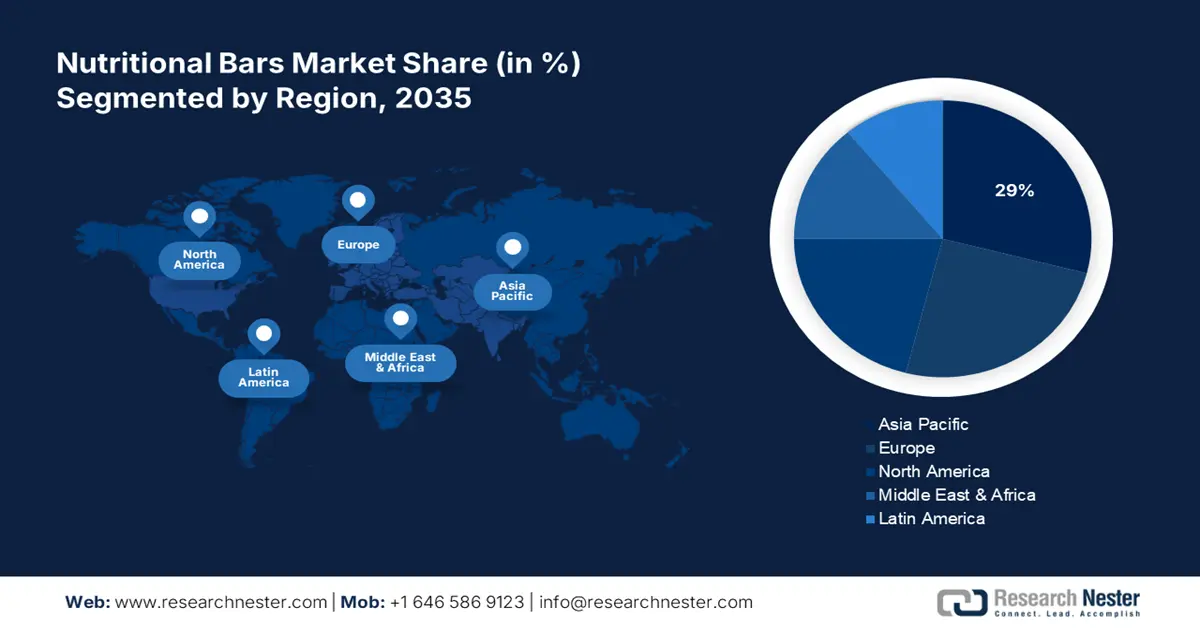Nutrition Bars Market Regional Analysis:
APAC Market Statistics
Asia Pacific in nutrition bars market is expected to account for more than 29% revenue share by the end of 2035. Consumers in Asia Pacific are becoming increasingly health-conscious, seeking convenient and nutrition bars, rich in protein, fiber, and vitamins, carer to the growing demand for balanced diets amidst busy lifestyles. Furthermore, urbanization across the region has led to hectic schedules, driving demand for portable, on-the-go food solutions. Nutrition bars provide a quick and easy way to meet the dietary needs of working professionals and students.
China has a robust e-commerce ecosystem, with platforms like JD.com and Alibaba, has made nutrition bars more accessible. Online channels allow manufacturers to reach a wider audience, offering convenience and personalized options through targeted marketing. Increasing consumer focus on health and fitness, driven by rising incomes and urbanization, has boosted demand for nutrition bars as convenient, nutrient-dense snacks. According to a report published by the USDA, in December 2023, the sales of snack foods including protein and health bars reached over USD 66 billion in the same year. The report further states, that the growth is expected to grow at an annual rate of 2.3%.
Consumers in South Korea are becoming more conscious of their health due to the rising concern about lifestyle diseases, and an aging population. Nutrition bars, rich in protein, fiber, and essential nutrients, cater to the growing demand for healthy, on-the-go snack options. Moreover, the growth of online grocery platforms and health-focused specialty stores has made nutrition bars more accessible, while aggressive marketing and promotional strategies boost their visibility across South Korea.
Europe Market Analysis
The nutrition bars market in Europe is set to expand exponentially owing to consumers increasingly adopting plant-based diets for ethical and environmental reasons. Nutrition bars made from sustainable, vegan ingredients cater to this growing preference, expanding nutrition bars market opportunities. Manufacturers are introducing innovative products with functional benefits, such as protein-rich, low-sugar, gluten-free, and keto-friendly bars. Additionally, flavors tailored to European tastes enhance consumer appeal.
The UK has a large and growing vegan population, fueling demand for plant-based and clean-label nutrition bars. Bars made from natural, organic ingredients without artificial additives appeal strongly to eco-conscious consumers. Manufacturers in the UK are introducing unique flavors, functional ingredients like collagen and probiotics, and tailored options such as keto-friendly and low-sugar bars, catering to diverse consumer needs and boosting nutrition bars market growth. In addition, distribution channels, including supermarkets, convenience stores, and rapidly growing e-commerce platforms, ensure widespread availability.
Emphasis on food safety and transparency in Germany encourages the production of high-quality, clean-label nutrition bars, increasing consumer trust and driving nutrition bars market growth. These bars not only help in managing weight and blood sugar levels but also promote satiety and energy, making them a preferred choice for health-conscious individuals. This has further caused the expansion of online grocery platforms and health-focused e-commerce channels making nutrition bars more accessible. Subscription models and personalized nutrition recommendations further boost consumer interest.


